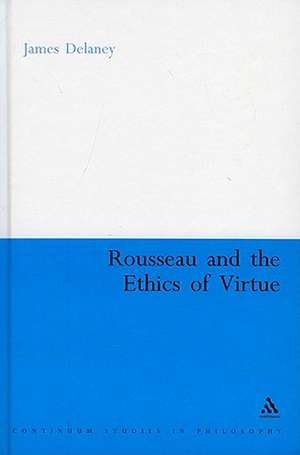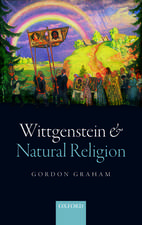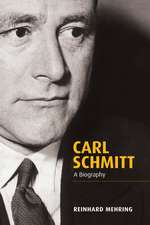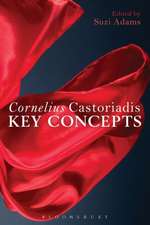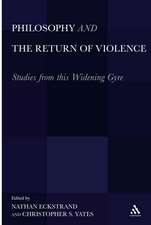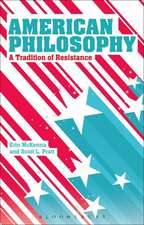Rousseau and the Ethics of Virtue: Continuum Studies in Philosophy
Autor James Delaneyen Limba Engleză Hardback – 14 sep 2006
Jean-Jacques Rousseau is an enigmatic figure in many ways. There is much debate about whether he was an advocate of the Enlightenment project or a critic of it. Sometimes Rousseau seems to be arguing against traditional values and hierarchies. But elsewhere he seems to be an enemy of progress altogether. This book explains Rousseau's true place in the Enlightenment by paying particular attention to his account of virtue.
Virtue ethics is one of the main branches in moral philosophy, and its most famous advocate is Aristotle. Many recent philosophers have tried to revive virtue ethics, most notably Alasdair MacIntyre in his 1984 book, After Virtue. MacIntyre argues that the Enlightenment project was doomed to fail precisely because Enlightenment philosophers had discarded Aristotle. They do this by rejecting Aristotle's claim that all things are, by nature, directed towards some proper end. The enlightenment figures whom MacIntyre discusses at length in his critique are Hume, Kant, and Kierkegaard. And while Rousseau is mentioned as an Enlightenment thinker, very little attention is paid to him.
This book puts Rousseau's ethics into historical perspective, showing that Rousseau shares important characteristics with his contemporaries as well as with the tradition of Aristotle. The dichotomy set up by MacIntyre and others between the ethics of the ancient tradition and that of the Enlightenment is oversimplified. By taking a serious look at Rousseau's ethics, we can see that he forms a bridge between these two rich traditions in the history of Western philosophy.
Virtue ethics is one of the main branches in moral philosophy, and its most famous advocate is Aristotle. Many recent philosophers have tried to revive virtue ethics, most notably Alasdair MacIntyre in his 1984 book, After Virtue. MacIntyre argues that the Enlightenment project was doomed to fail precisely because Enlightenment philosophers had discarded Aristotle. They do this by rejecting Aristotle's claim that all things are, by nature, directed towards some proper end. The enlightenment figures whom MacIntyre discusses at length in his critique are Hume, Kant, and Kierkegaard. And while Rousseau is mentioned as an Enlightenment thinker, very little attention is paid to him.
This book puts Rousseau's ethics into historical perspective, showing that Rousseau shares important characteristics with his contemporaries as well as with the tradition of Aristotle. The dichotomy set up by MacIntyre and others between the ethics of the ancient tradition and that of the Enlightenment is oversimplified. By taking a serious look at Rousseau's ethics, we can see that he forms a bridge between these two rich traditions in the history of Western philosophy.
Din seria Continuum Studies in Philosophy
-
 Preț: 255.58 lei
Preț: 255.58 lei -
 Preț: 256.59 lei
Preț: 256.59 lei - 22%
 Preț: 256.29 lei
Preț: 256.29 lei - 31%
 Preț: 890.62 lei
Preț: 890.62 lei - 18%
 Preț: 304.66 lei
Preț: 304.66 lei -
 Preț: 254.93 lei
Preț: 254.93 lei - 24%
 Preț: 249.00 lei
Preț: 249.00 lei - 22%
 Preț: 889.49 lei
Preț: 889.49 lei - 31%
 Preț: 890.86 lei
Preț: 890.86 lei - 22%
 Preț: 1064.84 lei
Preț: 1064.84 lei - 31%
 Preț: 947.54 lei
Preț: 947.54 lei - 23%
 Preț: 255.11 lei
Preț: 255.11 lei - 31%
 Preț: 888.74 lei
Preț: 888.74 lei - 31%
 Preț: 890.72 lei
Preț: 890.72 lei - 22%
 Preț: 1005.49 lei
Preț: 1005.49 lei - 22%
 Preț: 946.72 lei
Preț: 946.72 lei -
 Preț: 254.75 lei
Preț: 254.75 lei - 22%
 Preț: 1005.98 lei
Preț: 1005.98 lei -
 Preț: 255.19 lei
Preț: 255.19 lei - 31%
 Preț: 889.15 lei
Preț: 889.15 lei - 31%
 Preț: 1006.06 lei
Preț: 1006.06 lei - 22%
 Preț: 889.23 lei
Preț: 889.23 lei - 22%
 Preț: 947.86 lei
Preț: 947.86 lei - 22%
 Preț: 256.49 lei
Preț: 256.49 lei - 31%
 Preț: 888.58 lei
Preț: 888.58 lei - 14%
 Preț: 1006.24 lei
Preț: 1006.24 lei - 31%
 Preț: 891.51 lei
Preț: 891.51 lei - 22%
 Preț: 1005.89 lei
Preț: 1005.89 lei -
 Preț: 256.38 lei
Preț: 256.38 lei - 31%
 Preț: 1152.60 lei
Preț: 1152.60 lei - 23%
 Preț: 255.38 lei
Preț: 255.38 lei - 22%
 Preț: 1006.72 lei
Preț: 1006.72 lei - 31%
 Preț: 946.72 lei
Preț: 946.72 lei - 22%
 Preț: 257.76 lei
Preț: 257.76 lei - 22%
 Preț: 1005.18 lei
Preț: 1005.18 lei -
 Preț: 256.49 lei
Preț: 256.49 lei -
 Preț: 256.38 lei
Preț: 256.38 lei - 31%
 Preț: 1003.53 lei
Preț: 1003.53 lei -
 Preț: 258.42 lei
Preț: 258.42 lei - 19%
 Preț: 464.39 lei
Preț: 464.39 lei - 22%
 Preț: 1005.89 lei
Preț: 1005.89 lei - 22%
 Preț: 1005.56 lei
Preț: 1005.56 lei - 11%
 Preț: 465.66 lei
Preț: 465.66 lei - 22%
 Preț: 1006.62 lei
Preț: 1006.62 lei - 13%
 Preț: 255.66 lei
Preț: 255.66 lei
Preț: 1005.72 lei
Preț vechi: 1169.45 lei
-14% Nou
Puncte Express: 1509
Preț estimativ în valută:
192.51€ • 209.17$ • 161.81£
192.51€ • 209.17$ • 161.81£
Carte tipărită la comandă
Livrare economică 21 aprilie-05 mai
Preluare comenzi: 021 569.72.76
Specificații
ISBN-13: 9780826487247
ISBN-10: 0826487246
Pagini: 208
Dimensiuni: 156 x 234 x 11 mm
Greutate: 0.42 kg
Ediția:New.
Editura: Bloomsbury Publishing
Colecția Continuum
Seria Continuum Studies in Philosophy
Locul publicării:London, United Kingdom
ISBN-10: 0826487246
Pagini: 208
Dimensiuni: 156 x 234 x 11 mm
Greutate: 0.42 kg
Ediția:New.
Editura: Bloomsbury Publishing
Colecția Continuum
Seria Continuum Studies in Philosophy
Locul publicării:London, United Kingdom
Caracteristici
A long overdue book that will hugely benefit Rousseau scholars and those working at the cutting edge of contemporary moral philosophy.
Cuprins
Introduction
Chapter 1: Rousseau's Conception of Virtue: A threefold Classification of Good Human Beings
Chapter 2: Rousseau and Aristotle: Nature and the Sociability of Human Beings
Chapter 3: Virtue and Moral Education: Similarities Between Aristotle and Rousseau
Chapter 4: Rousseau's Place in Enlightenment Thinking: The Influence on Kant
Chapter 5: Rousseau and the Enlightenment Project: A Response to MacIntyre
Conclusion
Bibliography
Index
Chapter 1: Rousseau's Conception of Virtue: A threefold Classification of Good Human Beings
Chapter 2: Rousseau and Aristotle: Nature and the Sociability of Human Beings
Chapter 3: Virtue and Moral Education: Similarities Between Aristotle and Rousseau
Chapter 4: Rousseau's Place in Enlightenment Thinking: The Influence on Kant
Chapter 5: Rousseau and the Enlightenment Project: A Response to MacIntyre
Conclusion
Bibliography
Index
